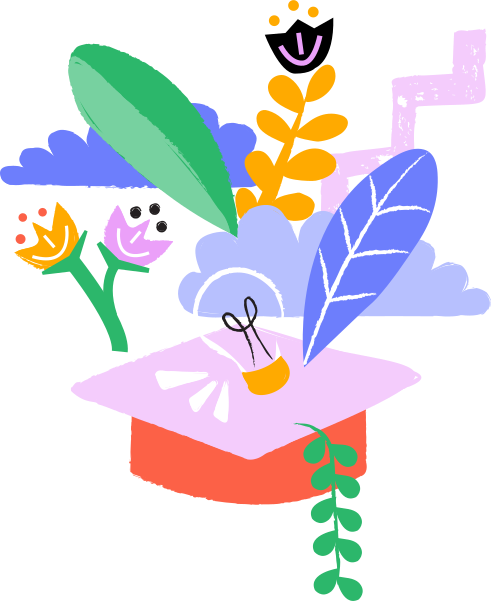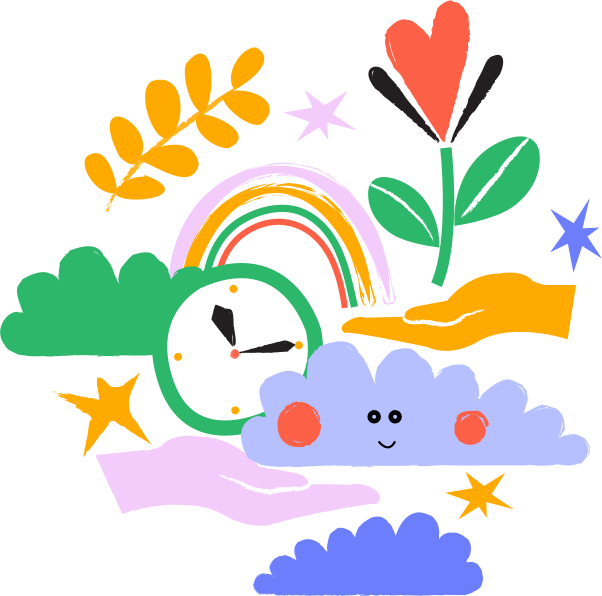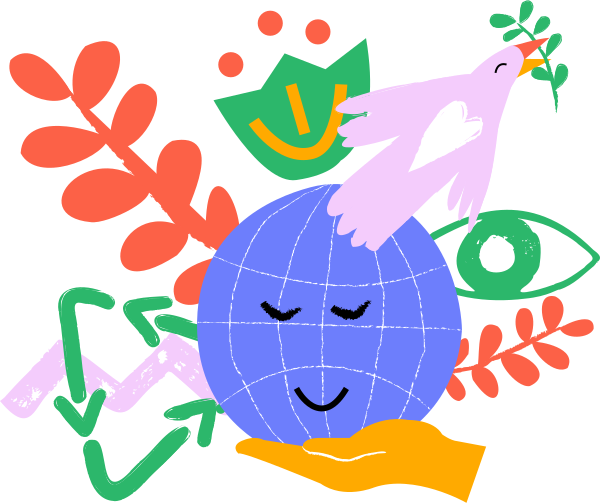
Science is about exploring the world. We believe that the world is best learned through play - you have to touch it, run and sometimes splash in a puddle.
Below are some of our workshops and educational projects
Emotional education workshops

We run workshops on emotional education. What do the Kurds think sadness tastes like? What is the greatest joy for Roma children? And Polish? Russian? Portuguese? We do not know. But we will find out!
For whom?
For kids from both distant and close countries. We are most interested in small nations in large countries: Kurds, Roma, Tatars, Lemkos, Chechens, Kists, Boykos, Altai, Nenets, Mari El ... In the meantime we try to learn their culture from the inside out, we collect fairy tales and recipes.
So far, we have carried out workshops at schools, kindergartens, hospitals, orphanages, refugee centers, socio-therapeutic day care centers and even prisons. Sometimes we just conducted classes on the street or in rural glades. We have worked with children from Poland, Jordan, Kurdistan, Syria, Palestine, India, Mexico, Guatemala, Ukraine, Moldova, Georgia, Armenia, Romania, Serbia, Macedonia, Kosovo, Spain, Portugal, Chechnya and Russia.
What is emotional education?
During development, people experience various crises. The conflict between the need for independence and the pursuit of closeness, fear of challenges, frustration associated with failure, various losses. Just as body development requires a balanced diet, movement and air, so does emotional development require good patterns: parental (or other adult) support, attention and patience. Of course, without these factors, people will develop somehow, but - continuing the body metaphor - if someone is malnourished in childhood, they are likely to have health problems as adults. A child who had to find a way of taming it's emotions on their own may later not know what to do e.g. with anger. Because of that, for example, he reacts to everything with aggression, or on the contrary - suppresses anger in himself. It affects health and relationships with others. Emotional education is a bit like providing the body with vitamins. This is not about therapy. We give space to name emotions. We teach how to show them in a good (for ourselves and the environment) way. Just knowing that others have feelings too is very important.
Shadow Theater

We take children into the magical world of fairy tales and legends with the help of performances in the technique of shadow theater and various workshops. At the same time, we share about things that are important to us. Shadow Theater is a starting point for talking to children about values. With its help, we teach sensitivity and tolerance, as well as expressing emotions, which is an important element in the development of a child. We combine fun with usefulness, art with education. We are not afraid of difficult topics, instead we wrap them in fairy tales for the children. We are open to suggestions of issues that we can raise in our creative work.
We invite you to familiarize yourself with our offer:
Warsaw Legends - a show about 40 min long, with live music, presenting the 4 most important Warsaw legends: Wars and Sawa, Warsaw Mermaid, Basilisk and the Golden Duck. The performance is an excuse to talk with children on topics such as: love and tolerance, freedom, fear, materialism.
The Snow Queen - Kai and Gerda's fairy-tale journey through the Land of Snow. The story of friendship, perseverance in overcoming difficulties and about emotions accompanying life + workshops on emotions
Roma Fairy Tale - about closeness to nature, a fairy tale familiarizing with Roma culture + workshops on other cultures, developing tolerance
So far, we have staged our performances for children from Warsaw hospitals and Guatemalan children's homes, in the Mexican streets and in Portuguese children's homes. Visiting the Polish diaspora is also a great joy for us -until now, with light and shadows, we have brought the Polish culture to Moldova, Spain, Portugal, Mexico and Guatemala.
Powsinoga Theater

Every year, at the beginning of July, we set off on a journey. Not far away. But with a theater. It will be intergenerational, multicultural, integrative and very cheerful.
We create the puppets ourselves and direct the show. Then we stage it to the villagers and our friends.
That's basically the point. In addition, we plan bonfires, swimming in the river, building huts from branches and many other serious matters.
We create the program together and encourage everyone to share what they know best...
We invite you to join the traveling troupe of the theater.
Everyone is welcome!
Ethical Embroidery

There are various ways to talk about important matters. One is with needle and mouline. As part of Ethical Embroidery, we invite you to:
workshops, during which we remind about who really sews clothes purchased in chain stores
and
we embroider on clothes manifestos of solidarity with war zones.
It's easy to forget who made our dress or jeans boght from the chain store. And yet behind the clothing from popular brands there are specific hands at a specific machine. Although European cut, if we delve into the tag, the laconic inscription will reminds us of a lady from Bangladesh, China or Morocco. During the meetings, we want to remind of those who are actually creators of clothes - about seamstresses. We talk about their situation, and also decorate clothes from chain stores with embroidery referring to the traditions of the country they come from.
We hope that this embroidery, worn like a beautiful banner, will become a starting point for talks on topics such as ethical fashion, conscious consumer behavior, the situation of dressmakers in Asia or the situation in countries where war is waging.
Half of the money gathered is given to the teacher, the other half is transferred to a specific account, depending on the type of workshop:
Manusherjonno foundation, which supports dressmakers in Bangladesh
or the Red Cross / Crescent of the country in solidarity with which we embroider manifestos.
Kitchen Stories

Kitchen Stories are intercultural meetings at a common table. The refugees and migrants living in Poland take us to the world of their culture, as well as their personal history. Meanwhile, we learn to cook their favorite recipes.
So far, we have carried out several hundred of such meetings in Senior Homes, theaters, Community Centers, Universities of the Third Age, private homes, sociotherapeutic clubs and schools.
We love the smell of spices and the sound of sizzling fat. Flour flying in the air.
We also love the fact that it reverses roles and people in a refugee situation have the opportunity to show how much they contribute to our culture.
And we love the questions that come during these meetings. The coolest are usually asked by children. Sometimes sweet: "Can the right to hug be considered human rights?". And ever since the topic became popular and hot, there are factual and difficult questions: "How do refugees work?", "Aren't they dangerous?"
During the meetings they can meet real people. Mythical, dangerous "alien" ceases to be scary due to being unknown.
Manual Stories

In the past, women used to meet at feather tearing. We want to return to this tradition, but leave the geese alive - we invite you to the Saturday handicraft workshop. Our teachers will be migrants living in Warsaw, who will teach us what is most interesting in their culture. We have people from Kyrgyzstan, Uzbekistan, Ukraine, Syria, Kurdistan, Chechnya, Kazakhstan, Belarus and Georgia working with us.
Layette for Greta

In 2012, part of our team took an expedition with workshops on emotional education, through countries of the former Soviet Union. We planned for it to last 15 months and for each country we wanted to devote a month ... And maybe we would implement our plan if our route did not lead through a tiny (compared with e.g. great Russia) Moldova. This seemingly inconspicuous country delighted us and we left our heart in the town of Soroki. A large Roma community lives in Soroki, who welcomed us like family long unseen. The fed us, made us feel welcome, and didn't want to let us go further. We wanted to somehow repay all this good. We did workshops for the kids but we still felt that it was not enough. The daughter of our hosts, 8-year-old Greta, was exceptional. Smart, proud and confident. Her biggest dream was to go to school but her parents couldn't afford the layette and they didn't enroll her. They were afraid that due to poverty other students would be teasing their daughter. So, with the children, we made angels from salt. We sold them at the bazaar. Our friends contributed a little ... And so much money was collected that we could buy notebooks, crayons, school bags and pens for twelve children.
But enrolling in school is one thing. Education of the Roma is often a complicated matter. On many different levels. We decided to come to Soroki regularly and constantly support small students on their educational path. So far, we have implemented circus, recycling, music, photography, theater, film and fairy tale workshops in Soroki. Together with the whole community we have built a meadow library and we came there with a mobile cinema and our theater. We also learn a lot from them ... And some of the CzujCzuj members feel like they are family!






